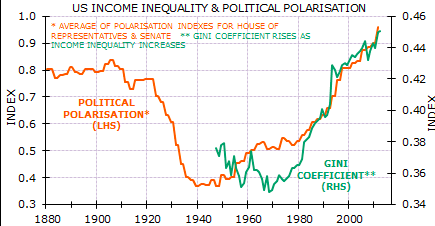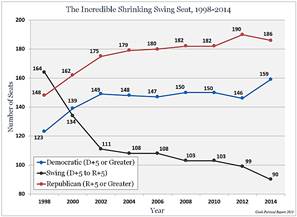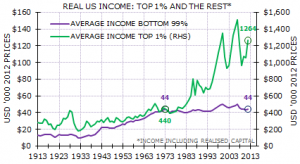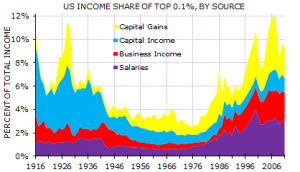Gerald Minack has a good post over at Naked Capitalism on the rise of Us vs. Them economy which just so happens to mention nothing about empty platitudes as a part of the solution.
Us Versus Them « naked capitalism
Rising political polarisation in the US has gone hand-in-hand with rising income inequality, falling top-end tax rates, lower taxes on business, rising leverage and higher asset prices. These trends may be coincidental, but they seem to reinforce each other. The medium-term risk is that some of these trends reverse, as occurred after the 1920s.Congressional political polarisation and income inequality in the US are at multi-decade extremes (Exhibit 1). The polity is split; incomes are unequal.
The rise in polarisation partly reflects electoral gerrymandering that has sharply reduced the number of contestable seats (Exhibit 2). Only 20% of House of Representatives seats would change hands on a 5% swing. This increases the centrifugal influence of the party members who dominate the increasingly-decisive party primary elections.However, rising political polarisation pre-dates the decline in contestable seats: it started as incomes became more unequal. Inequality has not risen because the rich got richer faster than the poor. It increased because the income gains of the past 30 years have gone to the top 1%. Average income for the bottom 99% is now unchanged in real terms over the past 40 years (Exhibit 3). The rising tide did not lift all the boats: it floated a few yachts.In 2012 the highest-paid 1% earned 21½% of total income, according to academic Emmanuel Saez (http://elsa.berkeley.edu/~saez/). This is the highest share since the 1920s. The lift in top-end income mainly reflected a rise in business income and salary payments. Exhibit 4 shows the source of income for the highest paid 0.1%, as a percentage of total US income. The income share of the highest paid did not increase just because capital has done better than labour: it also reflects the increase in the share of salaries going to the highest paid.
If we want to all play nice and get along then we have to do something about the massive spread in Gini coefficient, its that simple. If we do, we'll all be happier and live longer because of it.




No comments:
Post a Comment